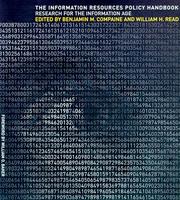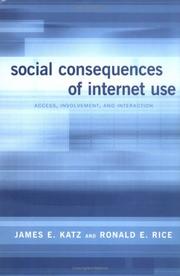| Listing 1 - 10 of 245 | << page >> |
Sort by
|
Book
ISBN: 1529214424 1529214432 1529214408 Year: 2023 Publisher: Bristol, UK : Bristol University Press,
Abstract | Keywords | Export | Availability | Bookmark
 Loading...
Loading...Choose an application
- Reference Manager
- EndNote
- RefWorks (Direct export to RefWorks)
Introducing the concept of 'knowledge alchemy' as the formulation of global standards through the use of indicators and algorithms, this book explores how knowledge alchemy increasingly informs national and institutional policies and practices on economic performance, higher education, research and innovation.
Book
ISBN: 9780262535083 9780262346191 0262346192 0262535084 0262346206 Year: 2018 Publisher: Cambridge, MA : The MIT Press,
Abstract | Keywords | Export | Availability | Bookmark
 Loading...
Loading...Choose an application
- Reference Manager
- EndNote
- RefWorks (Direct export to RefWorks)
Interdisciplinary perspectives on the role of new information technologies, including mobile phones, wireless networks, and biometric identification, in the global refugee crisis.

ISBN: 0262133466 9780262280105 0585088543 9780585088549 0262280108 9780262632225 9780262133463 0262632225 Year: 1999 Publisher: Cambridge (Mass.) : MIT press,
Abstract | Keywords | Export | Availability | Bookmark
 Loading...
Loading...Choose an application
- Reference Manager
- EndNote
- RefWorks (Direct export to RefWorks)
In Civic Space/Cyberspace Redmond Kathleen Molz and Phyllis Dain assess the current condition and direction of the American public library. They consider the challenges and opportunities presented by new electronic technologies, changing public policy, fiscal realities, and cultural trends. They draw on site visits and interviews conducted across the country; extensive reading of reports, surveys, and other documents; and their long-standing interest in the library's place in the social and civic structure. The book uniquely combines a scholarly, humanistic, and historical approach to public libraries with a clear-eyed look at their problems and prospects, including their role in the emerging national information infrastructure.
Documentation and information --- United States --- Libraries --- Public libraries --- Special collections --- Computer network resources. --- Computer network protocols --- INFORMATION SCIENCE/Technology & Policy --- Documentation --- Public institutions --- Librarians --- United States of America
Book
ISBN: 026237868X 0262378698 0262548062 Year: 2024 Publisher: Cambridge, Massachusetts : The MIT Press,
Abstract | Keywords | Export | Availability | Bookmark
 Loading...
Loading...Choose an application
- Reference Manager
- EndNote
- RefWorks (Direct export to RefWorks)
"This book is a history of U.S. regulations governing media and distribution infrastructures that support the cloud"--

ISBN: 0262032643 9780262270724 0585070156 9780585070155 9780262032643 0262270722 9780262519830 Year: 1999 Publisher: Cambridge, Mass. MIT
Abstract | Keywords | Export | Availability | Bookmark
 Loading...
Loading...Choose an application
- Reference Manager
- EndNote
- RefWorks (Direct export to RefWorks)
To understand the Information Age one must understand the concept of information as a resource. Like other basic resources, such as energy and materials, information resources are building blocks of society. But unlike energy and materials, they are far more abundant and versatile. Information resources include computers, telecommunications, the mass media, and financial services, all created or changed by the movement from analog to digital. This collection looks at the factors underlying digital technologies as well as the resulting public and strategic policy issues.
Computer. Automation --- Mass communications --- Information resources management --- Handbooks, manuals, etc. --- Corporations --- Information resource management --- Information systems management --- IRM (Information resources management) --- Management --- Management information systems --- INFORMATION SCIENCE/Technology & Policy

ISBN: 9781403972514 1403972516 1349533807 9786611366117 1281366110 0230605680 Year: 2007 Publisher: Basingstoke Palgrave Macmillan
Abstract | Keywords | Export | Availability | Bookmark
 Loading...
Loading...Choose an application
- Reference Manager
- EndNote
- RefWorks (Direct export to RefWorks)
A globalization of innovation has produced the most massive spurt in biotechnology in world history. Businesses, universities, and non-governmental organizations are collaborating to produce a "science-industrial complex" in biotechnology. Using case studies of stem cell research, cloning, genetically modified food, in-vitro fertilization, and chimeras in a number of Eastern and Western countries around the world, I argue that much of this biotech activity is global in nature and independent of state control. This shift in the relative influence of state and non-state actors has led to the virtual deregulation of biotechnology and the liberation of innovation from geo-political constraints. These trends post a number of interesting social, political, and ethical issues for the contemporary period and suggest the need to rethink how controversial moral issues are handled by the science-industrial complex.
Public administration --- Professional ethics. Deontology --- Biotechnology --- Globalization. --- Government policy. --- International relations. --- International organization. --- Biomedical engineering. --- Economic policy. --- Biotechnology. --- International Relations. --- International Organization. --- Biomedical Engineering/Biotechnology. --- R & D/Technology Policy.
Book
ISBN: 3030036235 3030036227 Year: 2019 Publisher: Cham : Springer International Publishing : Imprint: Springer,
Abstract | Keywords | Export | Availability | Bookmark
 Loading...
Loading...Choose an application
- Reference Manager
- EndNote
- RefWorks (Direct export to RefWorks)
This volume presents a selection of the Proceedings of the Workshop on Anticipation, Agency and Complexity held in Trento (Italy) on April 2017. The contributions contained in the book brilliantly revolve around three core concepts: agency, complexity and anticipation, giving precious insights to further define the discipline of anticipation. In a world that moves increasingly fast, constantly on the verge of disruptive events, more and more scholars and practitioners in any field feel in need of new approaches to make sense of the complexity and uncertainty that the future seems to bear. The theory of anticipation tries to describe how possible futures are intrinsically intertwined with the present.
Expectation (Philosophy) --- Anticipation (Philosophy) --- Philosophy --- Ontology. --- Economic policy. --- Technology—Sociological aspects. --- R & D/Technology Policy. --- Science and Technology Studies. --- Economic nationalism --- Economic planning --- National planning --- State planning --- Economics --- Planning --- National security --- Social policy --- Being --- Metaphysics --- Necessity (Philosophy) --- Substance (Philosophy)

ISBN: 9780262256506 0262256509 0585434980 9780585434988 9780262112697 0262112698 1282096516 9781282096516 9786612096518 6612096519 Year: 2002 Publisher: Cambridge, Mass. : MIT Press,
Abstract | Keywords | Export | Availability | Bookmark
 Loading...
Loading...Choose an application
- Reference Manager
- EndNote
- RefWorks (Direct export to RefWorks)
Drawing on nationally representative telephone surveys conducted from 1995 to 2000, James Katz and Ronald Rice offer a rich and nuanced picture of Internet use in America. Using quantitative data, as well as case studies of Web sites, they explore the impact of the Internet on society from three perspectives: access to Internet technology (the digital divide), involvement with groups and communities through the Internet (social capital), and use of the Internet for social interaction and expression (identity). To provide a more comprehensive account of Internet use, the authors draw comparisons across media and include Internet nonusers and former users in their research. The authors call their research the Syntopia Project to convey the Internet's role as one among a host of communication technologies as well as the synergy between people's online activities and their real-world lives. Their major finding is that Americans use the Internet as an extension and enhancement of their daily routines. Contrary to media sensationalism, the Internet is neither a utopia, liberating people to form a global egalitarian community, nor a dystopia-producing armies of disembodied, lonely individuals. Like any form of communication, it is as helpful or harmful as those who use it.
Internet --- Digital divide --- Telecommunication --- Electric communication --- Mass communication --- Telecom --- Telecommunication industry --- Telecommunications --- Communication --- Information theory --- Telecommuting --- DARPA Internet --- Internet (Computer network) --- Wide area networks (Computer networks) --- World Wide Web --- Social aspects --- INFORMATION SCIENCE/Technology & Policy
Book
ISBN: 9789812873811 9812873805 9789812873804 9812873813 Year: 2015 Publisher: Cham Springer Nature
Abstract | Keywords | Export | Availability | Bookmark
 Loading...
Loading...Choose an application
- Reference Manager
- EndNote
- RefWorks (Direct export to RefWorks)
The second volume in the SIRCA book series investigates the impact of information society initiatives by extending the boundaries of academic research into the realm of practice. Global in scope, it includes contributions and research projects from Asia, Africa and Latin America. The international scholarly community has taken a variety of approaches to question the impact of information society initiatives on populations in the Global South. This book addresses two aspects— Impact of research: How is the research on ICTs in the Global South playing a role in creating an information society? (e.g. policy formulation, media coverage, implementation in practice) and Research on impact: What is the evidence for the impact of ICTs on society? (i.e. the objectives of socio-economic development). This volume brings together a multiplicity of voices and approaches from social scientific research to produce an engaging volume for a variety of stakeholders including academics, researchers, practitioners, policy-makers and those in the business and civil sectors of society.
Social Sciences. --- Communication Studies. --- Information Systems Applications (incl. Internet). --- R & D/Technology Policy. --- Social sciences. --- Economics. --- Sciences sociales --- Economie politique --- Journalism & Communications --- Communication & Mass Media --- Economic policy. --- Communication. --- Communication, Primitive --- Mass communication --- Sociology --- Economic nationalism --- Economic planning --- National planning --- State planning --- Economics --- Planning --- National security --- Social policy --- Behavioral sciences --- Human sciences --- Sciences, Social --- Social science --- Social studies --- Civilization --- Application software. --- Application computer programs --- Application computer software --- Applications software --- Apps (Computer software) --- Computer software --- Communication Studies --- Information Systems Applications (incl. Internet) --- R & D/Technology Policy
Book
ISBN: 1137578785 1137578807 9781137578785 Year: 2016 Publisher: London : Palgrave Macmillan UK,
Abstract | Keywords | Export | Availability | Bookmark
 Loading...
Loading...Choose an application
- Reference Manager
- EndNote
- RefWorks (Direct export to RefWorks)
This book is open access under a CC BY 4.0 license. Presenting rigorous and original research, this volume offers key insights into the historical, cultural, social, economic and political forces at play in the creation of world-class ICT innovations in Kenya. Following the arrival of fiber-optic cables in 2009, Digital Kenya examines why the initial entrepreneurial spirit and digital revolution has begun to falter despite support from motivated entrepreneurs, international investors, policy experts and others. Written by engaged scholars and professionals in the field, the book offers 15 eye-opening chapters and 14 one-on-one conversations with entrepreneurs and investors to ask why establishing ICT start-ups on a continental and global scale remains a challenge on the “Silicon Savannah”. The authors present evidence-based recommendations to help Kenya to continue producing globally impactful ICT innovations that improve the lives of those still waiting on the side-lines, and to inspire other nations to do the same. .
Economic history. --- Economic policy. --- Development economics. --- Economy-wide Country Studies. --- R & D/Technology Policy. --- Development Economics. --- Economics --- Economic development --- Economic nationalism --- Economic planning --- National planning --- State planning --- Planning --- National security --- Social policy --- Economic conditions --- History, Economic --- Since 1963 --- Kenya --- Kenya. --- Cenia --- Chenia --- Colony and Protectorate of Kenya --- East Africa Protectorate --- GOK --- Government of Kenya --- Jamhuri ya Kenya --- Kenia --- Kenii͡ --- Kenniya --- Kenya Colony and Protectorate --- Ḳenyah --- Kīniy --- Kīny --- Quênia --- Republic of Kenya --- Research & Development --- Technology Policy --- Development Economics --- Digital communications --- Entrepreneurship --- Information technology
| Listing 1 - 10 of 245 | << page >> |
Sort by
|

 Search
Search Feedback
Feedback About UniCat
About UniCat  Help
Help News
News